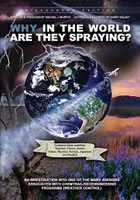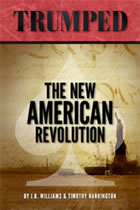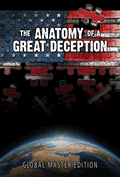By
Servando Gonzalez, Author of...
Psychological
Warfare and the New World Order and I
Dare Call It Treason, and the DVDs Treason
in America and Partners
in Treason.
September 9, 2016
NewsWithViews.com
Though I had read many of Seymour Hersh’s articles about the CIA in the New Yorker and the Washington Post, and read some reviews of his book about the Kennedys, The Dark Side of Camelot, I have to confess that I had never read any of his books in detail, much less critically. Nevertheless, I had a favorable opinion of him, and I thought he was an impartial critic of what is wrong with American politics.
Some months ago, however, mainly motivated by my interest in the Abu Ghraib incident, I began reading his Chain of Command: The Road from 9/11 to Abu Ghraib.[1] What I found has considerably changed my opinion about Hersh.
If there are some elementary norms for writing articles, the ones for writing non-fiction books are much more strict. Probably the most important one is to supply the reader with detailed notes, including name of publication, dates, and page numbers, so that the sources can be verified as truthful and that the quotes or references have not been taken out of context or misinterpreted.
Hersh’s articles show no references at all — which is bad, but somehow acceptable to some extent — but he has extended this sui generis style to book writing, and this is totally unacceptable. A direct result is that Hersh’s articles and books have absolutely no academic or informational value at all.
Moreover, for a person who deals mostly with intelligence and espionage, Hersh shows a total ignorance of a relevant concept in the intelligence profession: the distinction between intelligence and information.
Though intelligence is perhaps one of the most used terms in recent times, it is also one of the most misused. Just after a perfunctory reading of the mainstream press one can conclude that, most of the time, they use the term “intelligence” as a synonym for “information.” But that is a big mistake, because intelligence and information are not synonyms. Actually, they denote two very different things
According to the Joint Chiefs of Staff’s Dictionary of Military and Associated Terms, intelligence is the final product resulting from the collection, processing, integration, analysis, and interpretation of available information.[2] So, even though the term intelligence comprises something much more complex, we may safely accept the shorter definition that intelligence is just information after it has been properly evaluated.
The evaluation of information, also known as appraisal or assessment, has to do with the analysis of a piece of information itself in terms of credibility, reliability, pertinence and accuracy of both the source and the information itself, to change it into intelligence. The evaluation of information, which must follow a very specific set of rules, is accomplished at the fourth stage of the intelligence cycle.[3]
Unfortunately, just a perfunctory reading of Hersh’s articles and books shows that he does not know the most essential concept of the trade; the difference between information and intelligence. As a result, most, if not all, of the information Hersh provides and tries to pass as intelligence is just information.
Even worse, most of this information is based on hearsay. For example, just by reading a few pages of his Chain of Command, one can find this: “A senior Pentagon Officer said …” (p. 41), “A military consultant with close ties to the Special Operations community told me …” (p. 42), “An attorney involved in the case old me …” (p. 44), “The senior C.I.A. official told me …” (p. 48), “… a former senior intelligence official with direct information about the SAP gave me an account of how …” (p. 49).
Hersh’s violations of the most elementary rules of investigation are so blatant, that David Remnick, his New Yorker editor, felt forced to give an explanation in the Introduction he wrote for the book. According to Remnick,
A word about sources: Throughout this book you will encounter unnamed sources — officials, analysts, ambassadors, soldiers, and covert operatives — described by their jobs or their ranks, by their levels of expertise or their possible motivations, but not their proper names. Readers are often frustrated by this, and understandably so. Far lesser reporters conceal names because it is easier to do or even gives the piece a shadowy sense of big-time investigation. The problem is that in the areas in which Hearst reports, especially intelligence, it is usually impossible to get officials to provide revelatory, even classified, information and, at the same time, announce themselves to the world. They risk their jobs and, at times, prosecution. Also, contrary to what seems to be a very popular belief, the editors do not read the phrase “one high-ranking Army official said” and nod an immediate and grave assent. Trust but verify, as one president used to say. In every case, at The New Yorker, editors working on a piece ask the reporter who the unnamed sources are, what their motivations might be, and if they can be corroborated. (pp. xv-xvi)
Is Seymour Hersh a conduit for CIA disinformation? Well, wittingly or unwittingly he might be. Keep in mind that the best agent[4] is the one that does not know (or doesn’t want to know) that he has been recruited.
I am not implying that what Hersh writes is not true. I am just pointing to the fact that, because there is no way to verify what he writes, you need to take his word as truth. Now, given the fact that intelligence agencies are not reliable sources of information, and that most of what Hersh writes about allegedly has been told to him by intelligence operatives who are trained to become professional liars, one has to conclude that Seymour Hersh is not a reliable source of information. Therefore, the value of this book, as well as much of what he has written about, is highly questionable.
Last January, Hersh shocked the public with another revelation in an article published in the London Review of Books, “Military to Military,” in which he gives alleged inside information about some U.S. military leaders ignoring Obama and bypassing him by having direct contacts with the Russian military.[5]
The most notable thing about Hersh’s article is that both he and the military leaders he interviewed for his article totally ignore the elephant in the living room: the Invisible Government of the United States.
Like many other leftists Hersh apparently believes that a deep, dark cabal is running the U.S. government. Unfortunately, he always looks for it in the wrong place. Initially his target was the “military-industrial complex.” Currently it is the neocons. In a presentation at UC Berkeley on Oct. 8, 2004 he told the audience, “They (the neocons) overran the bureaucracy, they overran the Congress, they overran the press, and they overran the military!”
|
|
Hersh apparently ignores that when CFR member President Dwight Eisenhower mentioned the military-industrial-complex in his Farewell address, it had already changed into the military-industrial-banking complex — fully under the control of Wall Street bankers. Moreover, nowhere in his writings Hersh mentions that most of the neocons are members of the nefarious Council on Foreign Relations — the true power behind the throne of American politics and the site of the Invisible Government of the United States.
It seems that, wittingly or unwittingly, legendary investigative journalist Seymour Hersh has always been unable to connect the myriad of evident dots that link every act of treason committed against the American people to the globalist conspirators at the Council on Foreign Relations. This makes him a totally unreliable source of useful intelligence.
Servando is the uthor of Psychological Warfare and the New World Order and I Dare Call It Treason, and the DVDs Treason in America and Partners in Treason, all of them available at NewsWithViews,
Footnotes:
1.
Seymour Hersh, Chain of Command: The Road from 9/11 to Abu Ghraib,
(New York: HarperCollins, 2001).
2.
Quoted in Michael Warner, “Wanted: A Definition of ‘Intelligence.’
Understanding Our Craft,” CIA’s
Center for the Study of Intelligence. For a more detailed analysis
of this process, see Servando Gonzalez, Pyschological Warfare and the
New World Order (Oakland, California : Spooks Books, 2010), Appendix II,
The Evaluation of Information, pp. 330-336.
3.
Intelligence Cycle: The process by which information is acquired, converted
into intelligence, and made available to policymakers. There are usually
five steps that constitute the intelligence cycle: 1. Planning and direction;
2. Collection; 3. Processing; 4. Analysis and evaluation; and 5. Dissemination.
4.
In the field of intelligence and espionage, professional spies are called
intelligence officers. Agents are the persons, usually foreigners who
betray their own countries, who are recruited by intelligence officers.
5.
Seymour Hersh, “Military to Military,” the London Review
of Books, Vol. 38 No. 1, January 7, 2016, pp. 11-14.
© 2016 Servando Gonzalez - All Rights Reserved
Servando Gonzalez, is a Cuban-born American writer, historian, semiologist and intelligence analyst. He has written books, essays and articles on Latin American history, intelligence, espionage, and semiotics. Servando is the author of Historia herética de la revolución fidelista, Observando, The Secret Fidel Castro: Deconstructing the Symbol, The Nuclear Deception: Nikita Khrushchev and the Cuban Missile Crisis and La madre de todas las conspiraciones: Una novela de ideas subversivas, all available at Amazon.com.
He also hosted the documentaries Treason in America: The Council on Foreign Relations and Partners in Treason: The CFR-CIA-Castro Connection, produced by Xzault Media Group of San Leandro, California, both available at the author's site at http://www.servandogonzalez.org.
His book, Psychological Warfare and the New World Order: The Secret War Against the American People is available at Amazon.com. Or download a .pdf copy of the book you can read on your computer, iPad, Nook, Kindle or any other tablet. His book, OBAMANIA: The New Puppet and His Masters, is available at Amazon.com. Servando's book (in Spanish) La CIA, Fidel Castro, el Bogotazo y el Nuevo Orden Mundial, is available at Amazon.com and other bookstores online.
His most recent book, I Dare Call It treason: The Council on Foreign Relations and the Betrayal of the America, just appeared and is available at Amazon.com and other bookstores online.
Servando's two most recent books in digital versions only are The Swastika and the Nazis: A Study of the Misuse of the Swastika by the Nazis and the first issue of the political satire series OBSERVANDO: American Inventors.
Website: www.servandogonzalez.org
E-Mail: servandoglez05(at)yahoo(dot)com















 Share
This Article
Share
This Article






